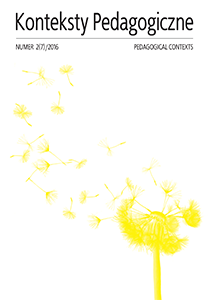Abstract
The growing number of children and young people with problems at school requires continuous improvement and enhancement of skills on the side of the teacher. Knowledge of a variety of therapeutic methods gives educators a large range of possibilities for interaction with students with special educational needs. To meet the needs of children and young people with learning difficulties, students learn various methods of working with children. Among many methods is the one of the Educational Kinesiology – a method highly controversial among Polish teachers and therapists. The aim of the article was to present the opinion of pedagogy students of this very method.
References
Dróżka W., Refleksyjność w działaniu społecznym a pedagogika, [w:] Pedagogika w działaniu społecznym, red. T. Dyrda, S. Scisłowicz, Ostrowiec Świętokrzyski 2004, s. 71–84.
Gładyszewska-Cylulko J., Arteterapia w pracy pedagoga. Teoretyczne i praktyczne podstawy terapii przez sztukę, Kraków 2011.
Gordzelewska B., Kinezjologia edukacyjna jako wsparcie dla uczniów o specjalnych potrzebach edukacyjnych, [w:] Terapia pedagogiczna, t. 2, red. E.M. Skorek, Kraków 2004.
Grzywniak C., Kinezjologia Edukacyjna. Metoda wspomagania rozwoju i terapii psychomotorycznej, Kraków 2006.
Hannaford C., Profil dominujący. Jak rozpoznać dominujące oko, ucho, półkulę mózgową, rękę i nogę, Warszawa 2003.
Hannaford C., Zmyślne ruchy, które doskonalą umysł, przeł. M. Szpala,Warszawa 1998.
Kinezjologia edukacyjna: nauka, pseudonauka czy manipulacja?, red. K. Korab, R. Boro-wiecka, E. Petrykiewicz, Warszawa 2008.
Kinezjologia edukacyjna – wsparcie dla uczniów o specjalnych potrzebach edukacyjnych. Nauka radosnego uczenia się, red. S. Masgutowa, W. Brejnak (Biuletyn Informacyjny Polskiego Towarzystwa Dysleksji, nr 21), Warszawa 2002.
Koneberg L., Forder G., Kinezjologia dla dzieci, Gdańsk 2009.Machoń M., Kinezjologia edukacyjna. Wpływ metody na poprawę uczenia się oraz jej wartości dla poradnictwa, „Dyrektor Szkoły” 2006, 10.Malinowska S., Kinezjologia edukacyjna, „Życie Szkoły” 2007, 9.
Meyer M., Szecówka A., Kinezjologia edukacyjna w pedagogice specjalnej – pomoc czy zagrożenie?, „Szkoła Specjalna” 2003, 1.
Nikodemska H., Praktyczne zastosowania kinezjologii edukacyjnej, [w:] Kinezjologia edukacyjna – wsparcie dla uczniów o specjalnych potrzebach edukacyjnych. Nauka radosnego uczenia się, red. S. Masgutowa, W. Brejnak (Biuletyn Informacyjny Polskiego Towarzystwa Dysleksji, nr 21), Warszawa 2002.
Nikodemska El Tairy H., Kinezjologia edukacyjna – fenomen skuteczności, Wrocław 2010.
Witkowski T., Kinezjologia edukacyjna, czyli nasz pierwszy kontakt z pseudonauką w szkole, www.racjonalista.pl/kk.php/s,6900 [dostęp: 05.05.2013].
Wójcik M., Skuteczność kinezjologii edukacyjnej w rozwijaniu umiejętności szkolnych uczniów z lekkim upośledzeniem umysłowym, niepublikowana praca doktorska, Lu-blin 2011.
Wyrwał A., Refleksyjność – powszechny element stylu życia dorastającego człowieka, [w:] Styl życia i zachowania prozdrowotne – wybrane konteksty, red. M. Świderska, Łódź 2011.
Zwoleńscy A. i L., O gimnastyce... tym razem mózgu, „Lider” 2001, nr 4.
Zwoleńscy A. i L., O gimnastyce... tym razem mózgu, cz. 2, „Lider” 2002, nr 1.
In accordance with the recommendation of the Ministry of Science and Higher Education, which aims to counteract the practice of “ghostwriting” and “guest authorship,” all authors submitting their text for publication should attach an author’s statement which declares the contribution of each of the authors to the article. The printed and signed statement should be delivered by mail or other means to editor-in-chief Joanna Skibska or sent in the form of a scan to the following e-mail address: redakcja@kontekstypedagogczne.pl. The authors will not receive remuneration for publishing their papers. The editors reserve the right to make minor editorial changes to the articles which will not affect the substance of the article. We encourage all authors to prepare their articles in accordance with the guidelines for manuscript preparation. Download pdf file.
Authors transfer all copyrights and grant the journal the right of first publication with the work simultaneously licensed under a Creative Commons Attribution License that allows others to share the work with acknowledgement of the work's authorship and initial publication in this journal. All authors agree to the publishing of their email addresses, affiliations and short bio statements with their articles during the submission process.

